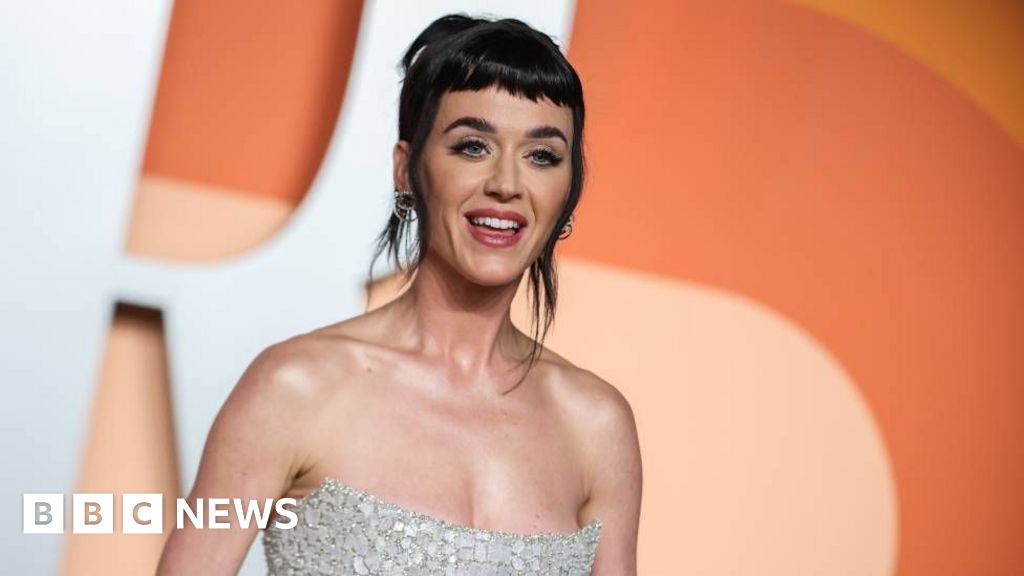Katy Perry Faces Backlash After Blue Origin Flight and Dance Moves

Katy Perry, the popstar known for hits like "Hot and Cold," recently described herself as a "human Piñata" in response to online backlash. This follows criticism of her involvement in a Blue Origin spaceflight and her latest musical endeavors. After a decade since headlining the Superbowl, Perry's public image has faced challenges, with mockery spreading online regarding her reaction to the spaceflight, including kissing the ground and expressing feeling "so connected to love."
Critics have also targeted her world tour, which began in Mexico on April 23, scrutinizing her dance moves and performances. Michael Cragg, a music writer, suggests that Perry's issues stem from being out of touch with current pop culture trends. Perry's pop persona, established in the 2010s, was characterized by cartoonish fun and playful imagery. Her album "Teenage Dream" matched Michael Jackson's record with five Billboard number one singles. However, her success has waned since then, with Cragg noting that she hasn't evolved.
Her recent comeback single, "Woman's World," intended as a female empowerment anthem, was criticized for its lyrical content and production by Dr. Luke, who faced sexual assault allegations. The song's underwhelming performance in the charts further compounded Perry's challenges. This follows a series of reinvention attempts, including her 2017 album "Witness," where she aimed for a socially conscious "purposeful pop" era. However, the album's mixed messages and reception contributed to her struggles.
Chappell Roan's success, driven by online authenticity and addressing toxic fandoms, contrasts with Perry's image. Perry's earlier hit, "I Kissed A Girl," faced controversy for its portrayal of lesbians, while Roan has achieved success with genuine queer expression. Cragg argues that the inconsistency in Perry's image has been detrimental in an era where defined pop star personas are thriving. While Perry's Las Vegas residency was commercially successful, it hasn't translated to a new generation of fans.
Cragg suggests that Perry's public image is now perceived as "cringeworthy," especially in the context of current global issues. However, the intense backlash also indicates deeper problems within pop culture. Simon Diego, from the Portal Katy Perry fan community, highlights the scale of abuse Perry has faced, with fans organizing support, including a digital billboard in Times Square. Perry acknowledged the backlash with her "Piñata" remark, noting the online environment where celebrities like her feel unsafe.
Diego points out that Perry's decision to keep her daughter's face off social media was even disregarded as commenters began targeting her child. Marie Claire Australia editor Georgie McCourt suggests misogyny plays a role in the criticism Perry faces, reserved for ambitious and visible women. Cragg suggests a hit single could help Perry regain momentum, but it may not return her to previous commercial heights.
You may also like...
Diddy's Legal Troubles & Racketeering Trial

Music mogul Sean 'Diddy' Combs was acquitted of sex trafficking and racketeering charges but convicted on transportation...
Thomas Partey Faces Rape & Sexual Assault Charges

Former Arsenal midfielder Thomas Partey has been formally charged with multiple counts of rape and sexual assault by UK ...
Nigeria Universities Changes Admission Policies

JAMB has clarified its admission policies, rectifying a student's status, reiterating the necessity of its Central Admis...
Ghana's Economic Reforms & Gold Sector Initiatives

Ghana is undertaking a comprehensive economic overhaul with President John Dramani Mahama's 24-Hour Economy and Accelera...
WAFCON 2024 African Women's Football Tournament

The 2024 Women's Africa Cup of Nations opened with thrilling matches, seeing Nigeria's Super Falcons secure a dominant 3...
Emergence & Dynamics of Nigeria's ADC Coalition

A new opposition coalition, led by the African Democratic Congress (ADC), is emerging to challenge President Bola Ahmed ...
Demise of Olubadan of Ibadanland
Oba Owolabi Olakulehin, the 43rd Olubadan of Ibadanland, has died at 90, concluding a life of distinguished service in t...
Death of Nigerian Goalkeeping Legend Peter Rufai

Nigerian football mourns the death of legendary Super Eagles goalkeeper Peter Rufai, who passed away at 61. Known as 'Do...



